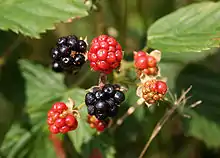silva
Galician

Etymology
From Old Galician-Portuguese silva, from Latin silva (“forest”).
Pronunciation
- IPA(key): /ˈsilβa̝/
Noun
silva f (plural silvas)
- bramble, blackberry bush
- 1460, José Antonio Souto Cabo, editor, Crónica de Santa María de Íria, Santiago: Ediciós do Castro, page 101:
- vijã grande[s] lumes de candeas arder de noyte et de dia en huũ monte muy espeso de muytas aruores et siluas, a oyto mjlias de Yria
- they saw large candle fires, burning day and night, in a very close forest, of trees and bambles, eight milles from Iria
- 1884, Marcial Valladares Núñez, Diccionario gallego-castellano, s.v. silva:
- Tente, silva; non me prendas, que n'estou n'a miña tèrra (traditional song)
- Hold yourself, bramble, don't catch me, 'cos I'm not in my country
- (archaic) forest
Related terms
References
- “silua” in Dicionario de Dicionarios do galego medieval, SLI - ILGA 2006–2022.
- “silua” in Xavier Varela Barreiro & Xavier Gómez Guinovart: Corpus Xelmírez - Corpus lingüístico da Galicia medieval. SLI / Grupo TALG / ILG, 2006–2018.
- “silva” in Dicionario de Dicionarios da lingua galega, SLI - ILGA 2006–2013.
- “silva” in Tesouro informatizado da lingua galega. Santiago: ILG.
- “silva” in Álvarez, Rosario (coord.): Tesouro do léxico patrimonial galego e portugués, Santiago de Compostela: Instituto da Lingua Galega.
Latin

Alternative forms
Etymology
Traditionally derived from Proto-Indo-European *sel-, *swel- (“firewood, wood, beam, board, frame, threshold”), and compared with Ancient Greek ὕλη (húlē, “wood, timber”) and Old English syl (“sill, threshold, foundation”). However, De Vaan is implicitly skeptical of this derivation, and leaves the origin open.
Pronunciation
- (Classical) IPA(key): /ˈsil.u̯a/, [ˈs̠ɪɫ̪u̯ä]
- (modern Italianate Ecclesiastical) IPA(key): /ˈsil.va/, [ˈsilvä]
Declension
First-declension noun.
| Case | Singular | Plural |
|---|---|---|
| Nominative | silva | silvae |
| Genitive | silvae | silvārum |
| Dative | silvae | silvīs |
| Accusative | silvam | silvās |
| Ablative | silvā | silvīs |
| Vocative | silva | silvae |
Derived terms
- silvestris
- Silvia
- silvicaedus
- silvicola
- silvicolens
- silvicomus
- silvicultrīx
- silvifragus
- silviger
- Silvius
- silvula
- Silvānus
- silvāticus
- silvēscō
- silvōsus
Descendants
References
- “silva”, in Charlton T. Lewis and Charles Short (1879) A Latin Dictionary, Oxford: Clarendon Press
- “silva”, in Charlton T. Lewis (1891) An Elementary Latin Dictionary, New York: Harper & Brothers
- silva in Charles du Fresne du Cange’s Glossarium Mediæ et Infimæ Latinitatis (augmented edition with additions by D. P. Carpenterius, Adelungius and others, edited by Léopold Favre, 1883–1887)
- silva in Gaffiot, Félix (1934) Dictionnaire illustré latin-français, Hachette.
- Carl Meißner, Henry William Auden (1894) Latin Phrase-Book, London: Macmillan and Co.
- wooded hills: montes vestiti silvis
- wooded hills: montes vestiti silvis
- De Vaan, Michiel (2008) Etymological Dictionary of Latin and the other Italic Languages (Leiden Indo-European Etymological Dictionary Series; 7), Leiden, Boston: Brill, →ISBN, page 564
Portuguese

Pronunciation
- (Brazil) IPA(key): /ˈsiw.vɐ/ [ˈsiʊ̯.vɐ]
- (Southern Brazil) IPA(key): /ˈsiw.va/ [ˈsiʊ̯.va]
- (Portugal) IPA(key): /ˈsil.vɐ/ [ˈsiɫ.vɐ]
- (Northern Portugal) IPA(key): /ˈsil.bɐ/ [ˈsiɫ.βɐ]
- Homophone: Silva
- Hyphenation: sil‧va
Etymology 1
From Old Galician-Portuguese silva, from Latin silva, from Proto-Indo-European *swel-, *sel- (“mountain, ridge, forest”). Compare the doublet selva and Galician silva.
The /i/ is puzzling. Philologist Leite de Vasconcelos felt that the word was not a Latinism and conjectured a term spīna *silvea with the same suffix as ligneus and pīneus, where the close post-tonic vowel would cause the stressed vowel to rise, as in marisma and sirgo.[1]
Noun
silva f (plural silvas)
- bramble (any of various thorny shrubs, especially those in the family Rubus)
- Synonyms: espinheiro, sarça
- (in particular) blackberry (Rubus fruticosus)
- Synonyms: amoreira, amora-silvestre, amoreira-silvestre
Etymology 2
See the etymology of the corresponding lemma form.
Verb
silva
- inflection of silvar:
- third-person singular present indicative
- second-person singular imperative
References
- 1920, Leite de Vasconcellos, Revista Lusitana, volume 23, page 188